
Image source: Nephron, Tumour budding in colorectal carcinoma - high mag (CC BY-SA 3.0)
News • Mysterious mechanism solved
Researchers discover how bowel cancer 'blinds' the immune system
A mystery which has stumped bowel cancer researchers for decades, has been solved by scientists at the Cancer Research UK Beatson Institute and University of Glasgow.
Generations of doctors and researchers have struggled to understand why a bowel cancer patient’s immune system ignores the cancer, rather than attack it. Now, the Cancer Research UK-funded team in Glasgow, also funded by the Medical Research Council and Wellcome, believe they know how bowel cancer “blinds” the immune system so it can’t see the cancer and is therefore unable to destroy it.
The discovery, published in Cancer Immunology Research, a journal of the American Association for Cancer Research, opens the door to potentially reversing or preventing this process, which would allow the immune system to “see” the bowel cancer cells and stop them from growing and multiplying.
If a way can be found to artificially engage the ‘blinded’ T cells with a drug so that the T cells can “see” the cancer again, we could find a new effective way to treat bowel cancer
Seth Coffelt
Dr Seth Coffelt of the Cancer Research UK Beatson Institute and University of Glasgow, who led the research, said: “Normally immune cells keep things as they should be, patrolling the bowel like security guards, tackling any harmful bacteria, and keeping the gut healthy. However, when cells in the bowel become cancerous, they fire these “security guards” and all the methods these immune cells use to talk to each other to coordinate an immune response no longer get produced. Cancer doesn’t want immune cells recognising them as a threat so they manipulate the immune cells so they can’t see the threat and simply pass on by leaving the cancer to do its damage.”
Bowel cancer is the second most common cause of cancer death in the UK* with around 16,800 deaths in the UK every year, that’s 46 every day. Around 4,000 people are diagnosed with bowel cancer each year in Scotland.
The research team focused on a particular type of immune cell called gamma delta T cells. Bowel cancer begins in the epithelial cells which line the bowel and these T cells “patrol” this area attacking any threats – such as damaged cells or small tumours – before they cause us harm. Scientists already knew that when bowel cancer is present, immune cells that can kill cancer do not often act against the bowel cancer, however they did not know why.
Using tissue samples from bowel cancer tumours donated by patients in Scotland and other countries, the team was able to identify the specific mechanism the cancer cells use to “rewire” the gamma delta T cells on a molecular level.
The team is now hopeful that further research could offer treatments which could reverse this “rewiring”. Discovering how the cancer cells trick the immune system offers potential for new treatments which could reactivate these crucial immune cells. Dr Coffelt added: “Our discovery means that if a way can be found to artificially engage the ‘blinded’ T cells with a drug so that the T cells can “see” the cancer again, we could find a new effective way to treat bowel cancer.”
Source: University of Glasgow
21.06.2023











